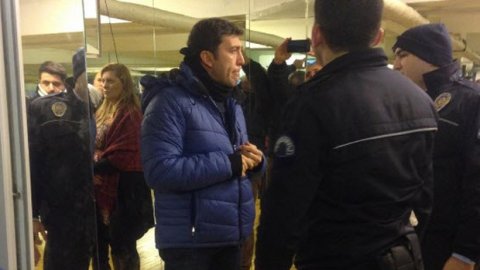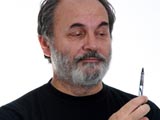Attacks Against Theater
by Tarık Günersel / December 20, 2013 / No comments
The Turkish Ministry of Culture refuses to give financial aid to private theaters that supported the Gezi Park protests.

Despite the legal process, security forces were sent to Emre Kınay's (left, blue coat) Duru Theater to lock the office and rehearsal space. Photo: Tarik Günersel.
PM Erdoğan and his yes-men have been trying to get rid of State Theater as well as the State Opera and Ballet.

- Life is words in action, literature is action in words.
- Humans are about to destroy their spaceship Earth. Some of them are aware of this and they try to change the course of events. Will they succeed? Will more humans be alarmed and do something?
- Literature is vital and translators are messengers of world peace.
- Though I shall focus on the literary scene in Turkey and its problems regarding freedom of expression, I shall not omit the other parts of our planet. Today local is global and vice versa.

- Tarık Günersel is a poet, playwright, aphorist, librettist and short story writer. He is the president of PEN Turkey and an ex-member of the PEN International Board. He studied English Literature at Istanbul University. A self-exile after the military coup in 1980, he spent four years in Saudi Arabia with his wife Füsun and their daughter Barış, teaching English. A dramaturg at Istanbul City Theater since 1991, he has acted on stage and screen and directed some of his plays. He proposed World Poetry Day in 1997 which was accepted by PEN International and declared by UNESCO as the 21st of March. His translations into Turkish include works by Samuel Beckett, Vaclav Havel and Arthur Miller. His works include The Nightmare of a Labyrinth (mosaic of poems and stories), and How’s your slavery goin’? His Oluşmak (To Become), a “life guide for myself,” includes ideas from world wisdom of the past four millennia. He has recently initiated the Earth Civilization Project with the support of several intellectuals from various parts of the planet.
The Gezi Park resistance has a special place in the struggle for democracy—both in Turkey and internationally—but the government has been trying to discredit the environmentalist protests that started in May. Under PM Erdoğan’s order, the police acted brutally during the protests: Five young people died in various cities, eleven lost an eye, and many were severely harmed. Since then the killers have been protected by the authorities and the victims have been charged.
PM Erdogan’s AK Party government has already imprisoned several youngsters without conviction. Hundreds of court cases have been opened. Some students have even been kept in jail for six months without an official accusation.
Every year, for the past few decades, the Turkish Ministry of Culture has granted financial aid to private and amateur theaters. However, this year the ministry has changed its position and done two negative things:
1.No financial aid has been given to private theaters that supported the Gezi Park protests.
2.The Ministry of Culture wants plays that are in harmony with the general morality of the public: No swearing, no eroticism, and no radical politics.
The Ministry has refused to grant financial aid to theater companies such as Emre Kınay’s (Duru Tiyatro), Nedim Saban’s (Tiyatro Kare), Genco Erkal’s (Dostlar Tiyatrosu), and Ferhan Şensoy’s (Ortaoyuncular).
To protest the Ministry’s actions, Murat Daltaban’s DOT and Kemal Kocatürk’s Tiyatro Kumpanyası theater companies have refused to accept the financial aid granted to them this year.
To make matters worse, authorities have illegally forced the brilliant and popular actor and director Emre Kınay and his private theater company, Duru Tiyatro, to move out of their base of operations in Istanbul’s prestigious Kadiköy Anadolu Lisesi high school. Kınay has spent more than 200,000 dollars renovating the auditorium in a contract with the school administration (and the Ministry of Education), which allows him to perform there. If that’s the case, how did this happen?
On December 11, the day after Human Rights Day, security forces were sent to Duru Theater as I was there with a group of journalists and theater lovers. The officials came in, the office and the rehearsal studio were emptied, and the keys were confiscated. The high school’s principal and pro-government authorities are responsible for this scandal. Performances will go on (at least for a while), only without the office and the rehearsal studio. Naturally, Emre Kınay will take the case to court.
A leading high school, Kadiköy Anadolu Lisesi was established in 1955 to educate youngsters with an emphasis on English and secularism, through a peace-loving, internationalist approach in harmony with national dignity—the same as Atatürk’s philosophy. When I was a student there its name was Kadıköy Koleji. Despite the change in name, it has remained highly competetive; the students are tested and selected from the country’s top fifth percentile.
Set by the Sea of Marmara, the school has a beautiful view of the water. The land is also worth a lot of money.
As the result of the AK Party’s anti-secularist, anti-theatre campaign, all private theater companies based in schools have been closed down or moved.
In the case of Emre Kinay’s Duru Theater, there is also a plan to get rid of the school in favor of a new, expensive residence—a plan that’s profitable for some pockets but detrimental to the intellectual and personal gains of thousands of students.
New protests? Ha. The government has now passed a law that increases its despotism: Anyone who protests and resists a government action which is for “public good” will be sent to prison.
“Erdocracy” must be replaced by a truly secular and democratic regime. In this light, the main opposition leader Kemal Kılıçdaroğlu’s recent visit to Washington is understandable.
Though various theaters are under attack in PM Erdoğan’s regime, it is essentially the art of theater that is losing ground. Not only some theaters, but theater itself is under attack in Turkey.




